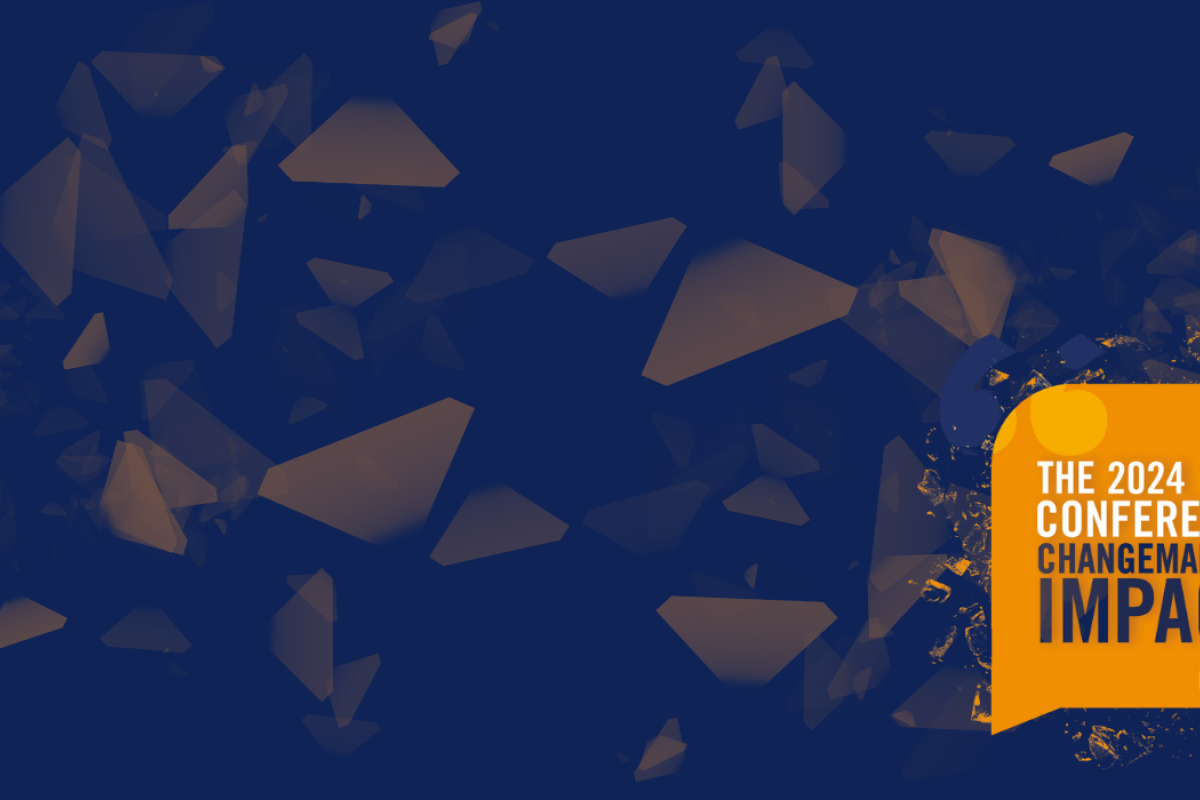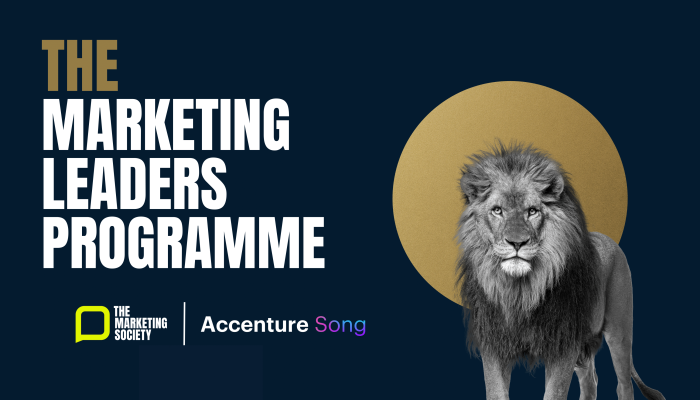In a rapidly evolving marketing landscape, where trends come and go at lightning speed, the concept of impact stands out as a guiding principle for marketers striving to create meaningful connections. As we gear up for our annual conference, centred around this pivotal theme, we sought insights from our esteemed members on a critical question:
What advice would you give to marketers looking to create campaigns that not only succeed but also leave a lasting impact?
Here's what they had to say:

The most important thing for me is to speak in plain language that people actually understand and connect with. You’d think it’s basic, but so many campaigns miss the mark because people can’t even figure out what they’re saying. Instead of just bragging about your product or service, focus on solving real problems your audience faces. When you show that you genuinely care about what matters to them, your campaign is much more likely to hit home. And if you want to make a lasting impact, there is something I always try to remember: people may forget your brand colours or catchy tagline, but they’ll never forget how your campaign made them feel. Make sure every interaction is positive, relevant, and leaves a meaningful impression. It’s all about making people feel understood and valued at every touchpoint
- Sylvia Assumpcao, Senior Director, Brand Marketing at OneStream Software
There is only one word that counts when it comes to creating successful campaigns AND having a lasting impact. It starts with ‘C’.
It’s not the one you think; the word is Consistency.
Consistency is the most underrated element in campaign success. McKinsey says that the three C’s when it comes to creating customer satisfaction are consistency, consistency and consistency. Most recent research from WARC and System 1 shows that ‘compound creativity” is the key to effectiveness in terms of recall and impact – consistent foundations, long term commitment and consistent executional vehicles. Basically, hold your nerve, resist the urge to change your idea as often as your socks, and don’t get conned into thinking that such a thing as ‘wear out’ exists in the minds of real people out there.
You’ll still need brilliant thinking and world-class creative ideas, but once you find them hold onto them like a palm tree in a hurricane. Ignore Elsa – do not let it go.
- Kevin Chesters, Founder, Consultant & Author
 To create successful and impactful marketing campaigns, it's essential first to define what 'success' and 'impact' mean to you, and importantly, your leadership. Consider the criteria for success—is it revenue generation, audience growth, sentiment shift, brand recall, or business growth? Understanding these metrics is crucial for you, your leadership, and especially your audience. Lasting impact can also be quantified from multiple perspectives: audience loyalty, product sales and market share, business performance regarding shareholder returns, and industry recognition through awards and reputation. While there may not be a one-size-fits-all answer, investing time in assessing expectations and establishing clear metrics will help align your focus and efforts toward the most effective channels and ideas.
To create successful and impactful marketing campaigns, it's essential first to define what 'success' and 'impact' mean to you, and importantly, your leadership. Consider the criteria for success—is it revenue generation, audience growth, sentiment shift, brand recall, or business growth? Understanding these metrics is crucial for you, your leadership, and especially your audience. Lasting impact can also be quantified from multiple perspectives: audience loyalty, product sales and market share, business performance regarding shareholder returns, and industry recognition through awards and reputation. While there may not be a one-size-fits-all answer, investing time in assessing expectations and establishing clear metrics will help align your focus and efforts toward the most effective channels and ideas.
- Mike Fairburn, Founder, Fathom Consulting

I believe creating campaigns that succeed in the short term and leave a lasting impact is about far more than just pushing a product or service. For me, it all starts with purpose. A campaign needs to have a reason for being, a clear alignment with brand values and an understanding of the world in which it operates.
It’s a noticeable trend that people nowadays are looking for something more meaningful—they want to connect with brands that stand for something, whether it’s sustainability, social change or supporting local communities. When a campaign reflects a brand’s purpose, it goes beyond the transactional, and that’s what makes it resonate on a deeper level.
Understanding the audience is key. But it’s not just about knowing who they are; it’s about really understanding what they care about and what drives them. I think it’s essential to dig into the details — we must ascertain what their challenges, aspirations and beliefs are.
When we, as marketers, tailor our messaging to reflect their world, we not only create something that speaks to them but also build a genuine connection. For me, the most impactful campaigns are those that feel personal, as though they were made specifically for the person watching or engaging with them.
Authenticity is non-negotiable. Consumers today are incredibly perceptive; they can quickly see through campaigns that feel forced or insincere. And if a brand’s campaign doesn’t reflect its true identity or values, it risks losing credibility. It’s not enough to follow a trend or take a stand on a popular issue if it doesn’t align with who the brand genuinely is. Of course, being honest and transparent is the best way to build trust, and trust is essential for any campaign to have a lasting impact.
One of the most powerful tools in marketing is storytelling. Stories are what connect us as humans. When a campaign tells a compelling story, it creates an emotional bond with the audience. It’s not just about selling a product; it’s about sharing a narrative that resonates. Whether it’s a story of triumph, overcoming adversity, or something more light hearted, storytelling allows a brand to communicate its message in a way that feels real and engaging. I believe that stories, more than anything else, make a campaign memorable.
And today, while data and analytics are crucial, creativity should never take a backseat. It’s important to find that balance between using data to inform decisions and allowing creative freedom to flourish. Data helps us target and measure, but it’s creative execution that grabs attention and makes a campaign unforgettable. I’ve seen time and time again how taking a creative risk can pay off in a big way, and it’s often those campaigns that challenge conventions that leave a lasting impression.
When thinking about long-term impact, sustainability is key. It’s not just about delivering quick wins but about creating campaigns that foster long-lasting relationships with consumers. I think brands that now integrate sustainability—whether through environmental consciousness or broader social responsibility—tend to stay relevant longer. For me, that’s the ultimate goal: creating something that continues to resonate long after the initial campaign has ended.
Finally, campaigns must be adaptable and multi-channel. Consumers interact with brands across various platforms, and successful campaigns reach people on whatever platform, in a way that feels seamless. But it’s not just about being present on multiple platforms; it’s about ensuring the messaging is consistent and engaging across all touchpoints. I’ve found that when each platform supports the others, the campaign as a whole becomes far more impactful.
What really matters is creating something special people will remember. It’s about having a purpose, telling a story and being authentic. It’s about understanding your audience and building something that will last. That’s the kind of campaign that leaves an impact, and that’s what I look for.
- Ananda Shakespeare, Shakespeare Communications, Dubai.

My advice would be to consider the "broadcaster" mindset with social content. It's not just about having a calendar, or an impulsive trending string of social posts, but considering how can you own your audience. What brings back your audience on a regular basis? What will build my audience? What will harvest and own attention?
My suggestion for a successful social/video strategy is to transform into a mindset similar to direct marketing. Investing in the long and the short with planned "returnable formats" on youtube/tiktok/instagram/meta, alongside the responsive "snackable" posts, combined with a special "splash" or #seasonal sizzle" which can attract a wider audience. This provides a solid foundation for a content strategy that grows and retains an audience. The special "splash" on social, whilst perhaps requiring a brand or sports partnership, maybe with talent or a sponsorship tie in, can easily create an impactful reach to new viewers and perhaps leave a lasting brand identity with your new subscribers. Once subscribed, the returnable/snackable posts keep the new audience engaged.
What was a pivotal marketing campaign or strategy that significantly shaped your perspective on the industry?
Red Bull (in particular Stratos) - Red Bull have capitalised on sports brand partnerships and proprietary sports team domination for many years. Their strategy to bring niche and extreme sports forwards with daring stunts and world class talent within their fields really demonstrated how attention can be manifested as well as owned. The stand out campaign for me was Red Bull Stratos, where Felix Baumgartner successfully reached outer atmosphere heights to attempt a free fall jump back down to earth, all whilst live streaming the effort. The stunt itself setting records on several fronts, but the sheer confidence to utilise social media to stream the event live was in itself a milestone. Not only did Red Bull capitalise on bringing many audiences together, but it also demonstrated significant reach to new audiences via multiple platforms. This created well over 8 million concurrent viewers, solidifying Red Bull's brand identity with its target audience and securing a significant increase in regular subscribers. The impact this left on me was the confidence placed in content strategy, creating shareable and effective social content that pulled in a target audience and then retained via a multi-platform effort to retain engaged viewers.
Can you share a moment when a marketing effort you were involved in made a tangible impact, either socially, economically, or within a community?
I was involved in and oversaw the launch of the marketing service "Enviromail", the world's first climate positive direct marketing solution aimed at mitigating and repaying the carbon emission "debt" associated with mailing large volume databases with Direct Mail. This service has seen millions of items of mail go beyond carbon neutral, with a 2x offset which is invested into third world gold standard and verified offset schemes, to help with climate justice. Not only does this make direct mail far more sustainable as a service for printed marketing, it also impacts society and smaller rural communities in developing nations who are more greatly affected by climate change.
- Richard Boon, CEO & Co-Founder - OH SIX agency

My first piece of advice is to ask yourself, why are you trying to leave a lasting impact and what are you trying to impact? If the answer to this question isn’t simply “my customer”, read on.
I am a fervid fan of Simon Sinek and his golden circle, but am dispirited when I see marketing campaigns trying to retrofit “purpose” into a campaign in a bid to win a Cannes award. In the words of the inimitable Mark Ritson, “If the purpose of purpose is purpose, then the success of any purpose campaign has to be measured on its social outcomes”, not how many awards it got.
How frustrating it is when Creative directors want to be “artists” as opposed to brilliant minds able to achieve concrete results through visuals and the written word. Sometimes it feels like marketers are today suffering from a similar delusion. We are working first and foremost to achieve the objectives of the organisation for which we work and to serve its customers. If we can dovetail this authentically into a meaningful societal purpose that’s good news for everyone, but campaigns that have truly positively impacted society are few and far between.
What I believe does impact society is when people and organisations have strong values and live by them through their behaviour and their communications. Inclusivity? Show people of determination or other minorities in your campaigns – all your campaigns. Sustainability? Ban brochures and flyers from your marketing practices. Innovation? Start by creating a safe space for your own team to innovate (where they can fail without consequence). For me impact happens over time with long-term commitment not with a single campaign, however great that campaign may be.
I learned a lesson in humility when I was doing research to create a support club for women entrepreneurs. I spoke to several existing organisations who do this all day every day as their core business. They asked why I wanted to create a new club when so many worthy organisations already exist. I didn’t have a good answer. My heart was in the right place, but I realised that I was creating a campaign not actually trying to make a difference. Supporting existing experienced organisations and charities will often create a much greater impact, even if you have to share the glory…
So, my bottom-line recommendation is,
- Understand what your organisation, company or client actually care about at their core. What their customers care about is also key, but if the organisation isn’t fully engaged, it won’t stand the test of time.
- Define specific indicators that you can use to measure your real-world success (I’m not talking about reach or likes here…).
- Turn these indicators into actual objectives.
- Then integrate these objectives into everything you do, at every level – for the long haul.
As marketeers we cannot just talk the talk - we need to walk the walk if we truly want to have an impact on the society in which we live.
- Jaki Ellenby, Senior Marketing Advisor, Dubai Municipality
In today's fast-paced marketing world, the insights shared by our members show just how vital it is to create campaigns that truly connect with people. By focusing on authenticity, purpose, and consistency, marketers can build relationships that go beyond just making a sale and leave a lasting impression.
As we reflect on the insights shared by our esteemed members, we’re excited to announce our upcoming series of conferences centered around the theme of impact. Last week, we successfully held our conference in New York, and we have five more events planned across various locations. These conferences will delve deeper into how marketers can create meaningful connections and drive lasting impact
- SCOTLAND - 22 October 9am - 6pm, National Museum of Scotland BOOK NOW
- UAE - 31 October 8.45am - 4.30pm, SEE Institute, The Sustainable City, Dubai BOOK NOW
- HONG KONG - 5 November 3pm – 8pm, Soho House Hong Kong BOOK NOW
- LONDON - 13 November 8am-5pm, QEII Conference Centre - BOOK NOW
- SINGAPORE - 14 November 2pm – 7pm, BOOK NOW



